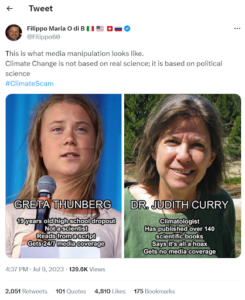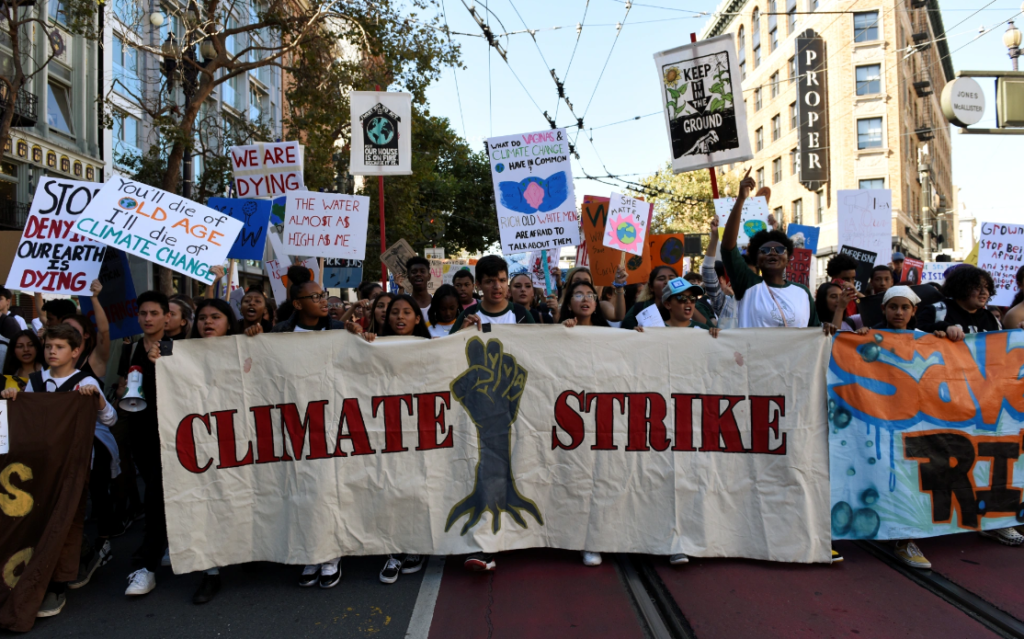Physical Address
23,24,25 & 26, 2nd Floor, Software Technology Park India, Opp: Garware Stadium,MIDC, Chikalthana, Aurangabad, Maharashtra – 431001 India
Physical Address
23,24,25 & 26, 2nd Floor, Software Technology Park India, Opp: Garware Stadium,MIDC, Chikalthana, Aurangabad, Maharashtra – 431001 India

By Aayushi Sharma
Claim: Climate change is not based on real science, it is now an agenda used by activists to gain popularity and it is driven on political influence.
Fact: The real climate talk doesnot require any political support. There are ample of scientific proof available to show that climate change is based on real science.
Post link:
What does the post say?
The twitter post has a caption, “This is what media manipulation looks like. Climate Change is not based on real science; it is based on political science.” The post also used the hashtag #ClimateScam. Along with the caption the post shares an image showing Greta Thunberg on one side and Climatologist Dr. Judith Curry on the other, informing that Greta who is not a scientist spreads about climate change whereas Dr. Judith calls it a hoax.
What we found?
According to a study, about 97.1% of the studies on anthropogenic global warming endorsed that humans are causing global warming. Another study published in 2021, showed results that more than 99 percent of peer reviewed studies in their dataset showed that scientific community is on a consensus that climate change is human induced.
The AR5 concluded that human influence on the climate system is clear, evident from increasing greenhouse gas concentrations in the atmosphere, positive radiative forcing, observed warming, and physical understanding of the climate system.

The global perspective on greenhouse gas emissions
Since 1990, greenhouse gas emissions have grown globally, putting humanity perilously near to the expected levels of hazardous global warming. The public has remained divided, and sizable, influential segments of the political class have shown little interest in the issue while scientific data about the causes of climate change has accumulated and a scientific community consensus has developed. For instance, despite the fact that 2017, according to the National Oceanic and Atmospheric Administration, was a year with 16 different billion-dollar natural disasters, the percentage of voters who were “very concerned” about climate change remained within the 40% range, where it has been rather stubbornly stuck for the past two years.

In a survey conducted by UNEP, participants were asked if they believed that climate change was a worldwide emergency and whether they supported 18 important climate policies that were spread over six areas of action: the economy, energy, transport, food and agriculture, nature, and safeguarding people.
Results indicate that people frequently seek broad climate policies that go beyond the situation as it is now. For instance, majorities supported greater renewable energy in eight of the ten survey nations with the greatest emissions from the power sector. Most people supported protecting forests and land in four of the five nations with the largest emissions from land-use change and sufficient data on policy preferences. Nine out of ten of the nations with the highest rates of urbanisation supported increasing the use of bicycles, clean electric vehicles, and buses.
Politics and Climate Change
First of all, it’s crucial to keep in mind that facts alone will never be enough to guide decision-making. Weighing costs, advantages, and hazards that are dispersed differently over the world is necessary for making decisions. Choosing between options entails values. Therefore, it is necessary to settle value conflicts and discrepancies before acting. Secondly, implementing climate change policy necessarily involves a wide range of political parties who are interested in and affected by the matter. Even when there is agreement on facts and principles, that complexity alone has the ability to slow down procedures.
The majority of people do not carefully read the scientific literature before forming their opinions on climate change. Humans frequently employ a range of cognitive shortcuts to hasten and effectively complete judgements. Thus, there are people who use the climate change agenda to gain political support, but this would be isleading to say that climate change is not real science but a political science. The need of the hour is to spread climte change awareness as it is a crucial environmental issue and not political agenda.
References: